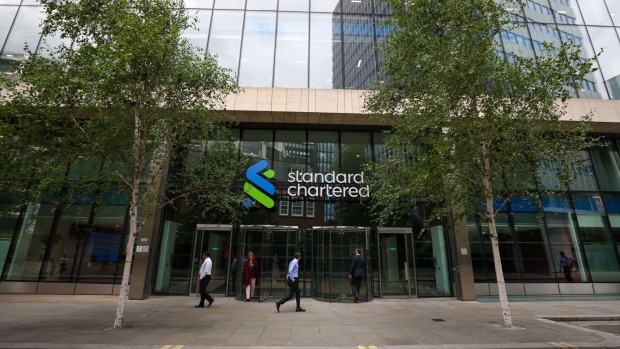Oct 26, 2023
StanChart Profit Misses Estimates With China Impairments
, Bloomberg News

(Bloomberg) -- Standard Chartered Plc is setting aside more cash to cover China-related losses, underscoring how a property crash and slowing growth in the world’s second-largest economy is hitting international banks. Shares tumbled.
The British lender said Thursday that it took a $186 million charge on Chinese real estate and an impairment of $700 million on China Bohai Bank, in which it has a 16% stake. Separately, Nomura Holdings Inc. is overhauling its China business after losses there snowballed, Bloomberg News reported Thursday.
Andy Halford, chief financial officer of Standard Chartered, said on Bloomberg Television that it remained difficult to call the bottom of the Chinese commercial real estate market. Though the trajectory remained uncertain, the “outlook, we still think, over the next two or three or four years is still very strong in the China region,” he said.
The hit taken by Nomura and Standard Chartered highlight the impact of the unfolding property crisis in China, where developers grappling with a years-long slump and a cash crunch are defaulting on bond payments. Though policymakers in Beijing have taken steps to rekindle demand, the sector has remained a drag on economic growth.
Standard Chartered shares plunged as much as 18% in London, the biggest intraday loss since August 2012, before trimming those declines to about 10% as of 10:46 a.m. local time. Nomura fell more than 2%.
Nomura’s Shanghai-based joint venture is reassessing its strategy, according to people familiar with the matter. Goals unveiled four years ago to raise its headcount to 500 and become a fully licensed securities house by the end of 2023 aren’t likely to be achieved, they said. Nomura Orient International Securities Co. has cut jobs and seen a number of departures following a management reshuffle earlier this year, the people added.
Wall Street majors such as JPMorgan Chase & Co. have also flagged the slowdown they are seeing in China. The New York firm has said its expansion in the Asian market is taking longer than expected. Goldman Sachs Group Inc. and Morgan Stanley are also scaling back their ambitions and profit goals there amid deteriorating geopolitical tensions and President Xi Jinping’s willingness to sacrifice economic priorities for security concerns, Bloomberg News has reported.
HSBC Holdings Plc, another Asia-focused lender, reports third-quarter results on Monday. Its shares fell as much as 3.3% in London.
Pretax profit for Standard Chartered fell 2% to $1.32 billion in the quarter through September, missing the $1.5 billion forecast by analysts tracked by Bloomberg. Operating income rose 6% in the quarter, driven by an increase in lending income and wealth management.
Jefferies analyst Joseph Dickerson said the “noisy” set of results was unexpected, noting a slight quarter-on-quarter fall in net interest margin was also a negative.
Standard Chartered has benefited from rising rates, though the impact has been dented by hedges put in place by the bank that mean it has yet to see the full gains come through. Winters said at a recent financial services conference that this would start to happen next March.
Share Buyback
Standard Chartered is planning to hand back more than $5 billion to investors and in July announced a $1 billion buyback alongside increased guidance for income growth for the year.
It kept all guidance for 2024 unchanged, with income growth expected at 8-10%.
Financial markets income slid 8% in the quarter. A downturn in the bank’s trading division was highlighted last month by Saleem Razvi, its chief financial officer of the Asian business, who warned that after last year’s “exceptionally strong” performance it would be a struggle to turn in a similar result.
“We remain highly liquid, and well capitalised,” Chief Executive Officer Bill Winters said in a statement. The lender is “confident in the delivery of our 2023 financial targets, including a return on tangible equity of 10%.”
What Bloomberg Intelligence Says
Standard Chartered’s almost $700 million impairment charge on its investment in Bohai Bank, due to weak earnings and China economic challenges, took the shine off 3Q results, with the bank sticking to guidance for return on tangible equity in 2023 and 2024. The shares have rallied over 15% year-to-date on improving revenue from rising rates. But the bank now faces a tough effort to deliver on 4% operating jaws (revenue less cost growth) and further loan losses (mainly on China property).
Tomasz Noetzel, BI analyst
--With assistance from Catherine Ngai and Sam Nagarajan.
©2023 Bloomberg L.P.


